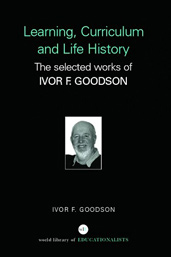Learning, Curriculum and Life Politics: the selected works of Ivor F. Goodson
Coming to Curriculum
The most obvious point to emerge from my journals, scribblings, and recorded conversations is what we might call my 'chronology of concern' or 'sequence of concern'. Quite clearly, in the first few years at the school, my concerns were primarily classroom focussed - how do we engage children in learning, particularly the majority of the children who were from working class homes. In finding my feet in teaching, in carving out a 'style', these were the first concerns. At the heart of the process of becoming a teacher for me was this question of pedagogic orientation. But I believe the question of pedagogic orientation carried an implicit amalgam of other values and positions. Pedagogic orientation clearly, I think, derived a good deal from personal strengths and weaknesses, as well as crucial matters of background such as social class and regional origins. But most importantly, I believe questions of pedagogic orientation crucially anticipate and circumscribe subsequent judgements about styles of curriculum, school governance and organisation right down to basic political judgements such as which sorts of schools, which types of pupils should be chosen and sponsored.
I should note that I am not here concerned to present evidence as to the quality of my classroom practice: about whether I was a good or bad teacher. My concern is to characterise my evolving view of pedagogic style and orientation and the juxtaposition of personal style and pedagogic style. The argument I wish to make is that this pedagogic orientation and interdependent sense of personal lifestyle is a crucially important consideration in the styles of curriculum, governance and schooling to which one gives allegiance. In short, in the interplay between personal lifestyle and pedagogic orientation there are many of the origins of teacher predispositions. Predispositions that are to support particular versions of subjects of syllabuses, curriculum projects, assessment procedures, as well as administrative decisions, political decisions, and issues of pastoral and community concern.
Coming to Curriculum
In the first years in teaching then my major concern was clearly with 'classroom matters' - with developing a pedagogic style and orientation. But in developing this pedagogic orientation, I was implicitly developing and furthering an allegiance to styles of curriculum, assessment, and schooling.
In part, this 'coming to curriculum', this requirement to examine and question existing styles of curriculum was part of an institutional search that went on at Countesthorpe in the early years. For if the radical relationships and pedagogies pioneered at the school were to survive, new styles of curriculum and assessment were necessary. Hence even probationary teachers like myself were involved in drawing up new syllabuses for examination at Mode 3.* A primary concern in developing curriculum was the need to engage students - as we have seen this was my major concern in the classroom, so it was inevitable that it would feed through into curriculum planning. In the classroom, the 'mixed ability' classroom, we sought to involve all students - so we sought a curriculum that reflected this 'comprehensive' intention.
